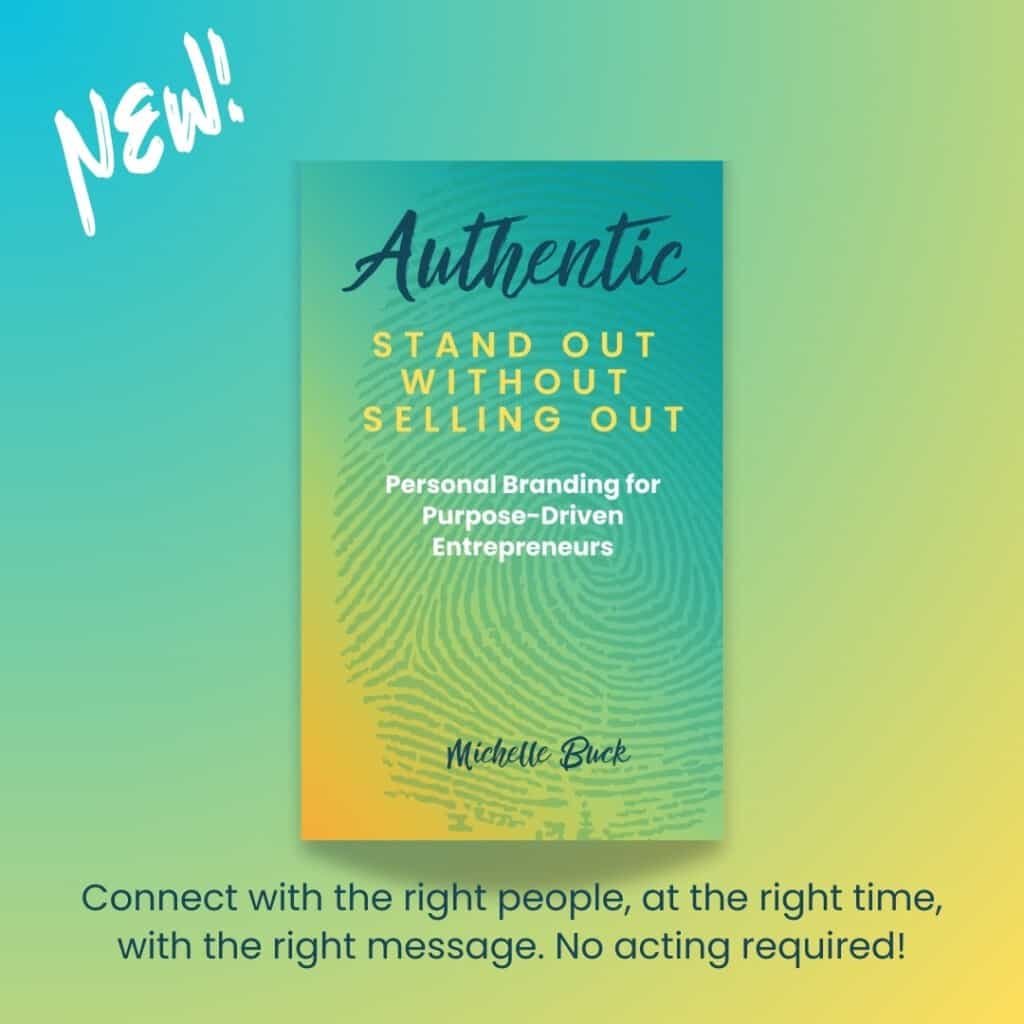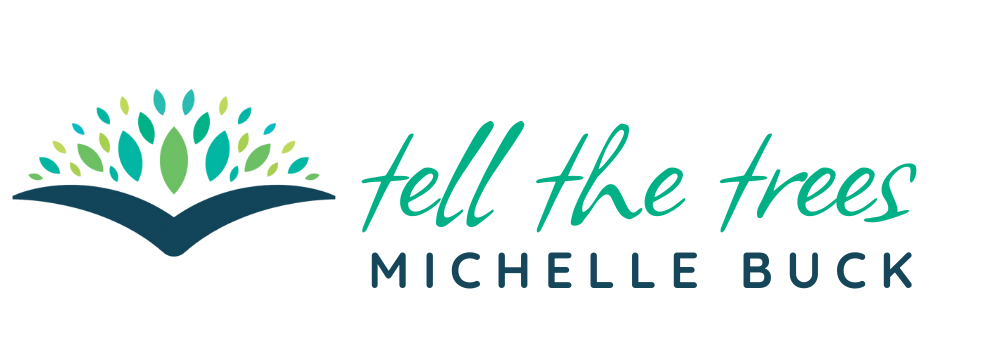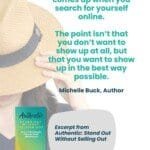by Michelle
Share
by Michelle
Share

Is your online presence helping or hurting your author journey?
Here’s reality – what pops up when someone Googles your name matters a ton if you’re an author trying to build a career.
Here’s something I wish someone had told me years ago: First impressions happen online now, not in person. The authors who get opportunities from their work aren’t necessarily better writers – they’re just easier to find online in a good way.
I figured this out the hard way. Since 2000, I’ve blogged about everything under the sun – Christianity, self-care, homeschooling, marketing – you name it. I’ve left my digital footprints all over platforms that don’t even exist anymore (remember Myspace? Yeah, me neither!).
I really wish someone had just told me: When your content is scattered across a bunch of different topics, it confuses people instead of making you look credible. All those random posts and profiles can actually make it harder for readers to trust you.
So let’s clean things up! Today, I’m sharing three simple steps that helped me turn my messy online presence into something that actually helps my author career instead of hurting it.

3 Simple Steps to Clean Up Your Online Author Image
Step 1: Find Out What’s Already Out There
Most of us make the mistake of only checking the first page of Google results and calling it a day. That’s not enough!
Here’s what I’ve found works much better:
- Use incognito mode on your browser (this shows what strangers see, not results tailored to your search history)
- Put your name in quotes: “Your Full Name” when you search
- Don’t forget to check Google Images (this is where the embarrassing stuff likes to hide!)
- Look through at least the first 3 pages of results
- Check other websites too using this search trick: “Your Name” site:platform.com (like “Michelle Buck” site:youtube.com)
When I did this recently, I was shocked to find I didn’t even show up until page 3 of Google! Joe Buck’s wife and the lady who runs the Hershey Company came up before me. If people have to dig that deep to find you, they probably won’t bother.
Step 2: Push the Good Stuff to the Top
Don’t just delete the stuff you don’t like—that leaves an empty space. Instead, you need to fill your online world with content you’re proud of.
Google tends to show these platforms first:
- LinkedIn (because it’s professional)
- YouTube (because Google owns it)
- Reddit (because it’s popular)
- Substack (which has become a go-to for writers and newsletters)
Here’s something most authors don’t realize: Google doesn’t necessarily show the best content first; it shows the newest and most relevant stuff. This means regular posts on these platforms will do better than one amazing post you wrote a year ago.
Start by updating or creating accounts on these main platforms, then worry about Facebook, Twitter, and Instagram later.
Step 3: Tie Everything Together
This is where lots of self-published authors (including me, in the past!) go wrong: we post random stuff all over the internet without making sure it all fits together.
Your online presence needs:
- A home base (your website) with your full name clearly visible
- The same bio info across all your profiles
- Words in your profiles that match what people might search for
- Regular posts that show what you’re all about as an author
- Links between your different platforms so people can easily find all your stuff

Photo Credit: Ivory Mix*
Getting Past the 3 Biggest Roadblocks
When you start cleaning up your online presence, you’ll probably run into these common problems:
Problem #1: “There’s negative stuff about me online that I can’t delete”
What works: Don’t stress about fighting it—just drown it out!
Create tons of new, positive content. Google naturally likes fresh, relevant content, especially if people are clicking on it and sharing it.
Problem #2: “I don’t have time to keep up with a million different websites”
What works: You don’t need to be everywhere!
Pick 2-3 main platforms where your readers actually hang out. Posting regularly on just a few sites works way better than random posts all over the place.
I personally focus on my website, Pinterest, and Substack.
Problem #3: “I have basically no online presence at all”
What works: This might actually be a good thing!
Grab your name on all the major platforms (even if you don’t plan to use them right away), then focus on building up the places that really matter for authors: Goodreads, Amazon Author Central, BookBub, and your own website.
What If Your Online Presence Actually Helped Your Author Career?
What if someone Googling your name actually made them more likely to buy your books or work with you?
Picture this: a potential reader, podcast host, or bookstore owner looks you up online and immediately finds:
- Nice photos that make you look like an actual author (not your cousin’s wedding pics!)
- Book descriptions that make people want to read more
- Blog posts or articles that show you know your stuff
- Happy comments from readers who loved your work
- Clear info on how to contact you or work with you
This isn’t just about avoiding embarrassment (though that’s nice too)—it’s about opening doors. From what I’ve seen, authors with a good online presence:
- Get invited to way more podcast interviews
- Have a much easier time booking speaking gigs
- Attract newsletter subscribers without pulling teeth
- Look more trustworthy to people browsing their books
The cool thing is, unlike book sales or reviews (which can feel totally out of your control), you actually have power over how you show up online.
I’ve helped many entrepreneurs with their online presence, and it’s amazing how things change – suddenly opportunities start finding them instead of the other way around!

In my book, Authentic: Stand Out Without Selling Out, I look at ways to create a core message that truly resonates with your audience. Your core message is the foundation of all your other messaging, so if you get that right – lots of others things fall into place too. And the best part? It’s not as hard as you think! You’ll learn three questions that really get to the heart of your messaging. Learn more here.
Go to the next post: Simple Ways to Define Your Personal Brand for Epic Results
This post was originally published on Medium and heavily updated for this website.
Tell the Trees is supported by its readers. When you make a purchase using links on this site, it may result in affiliate commission. Please visit my affiliate disclosure page for more information.
Let's Discuss It
Accessibility isn’t just nice to have; in fact, it’s now more important than ever. In 2025, over 1.3 billion people worldwide live with some form of disability, and many use e-readers or screen readers to access digital content. Yet most self-published authors continue to create ebooks that unintentionally exclude these readers. Microsoft Word, a tool
After my post about the European Accessibility Act, I got some fantastic questions from you that made me realize we need to have a more practical conversation especially regarding digital products. My original post focused on what’s been published — either written by lawyers for lawyers or aimed at big publishers with compliance departments. But what
One of the most often missed topics when it comes to writing and your office workspace is productivity. As a writer, you are focused on drafting, editing, book covers, ARC Reviews, and other important self-publishing topics, we forget that there are more efficient ways to do things. In your office or writing space, you might
The biggest threat for authors on Substack isn't competition or algorithm changes. It's something far more basic: the platform itself. Let's learn more.











